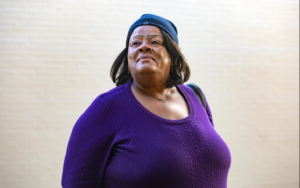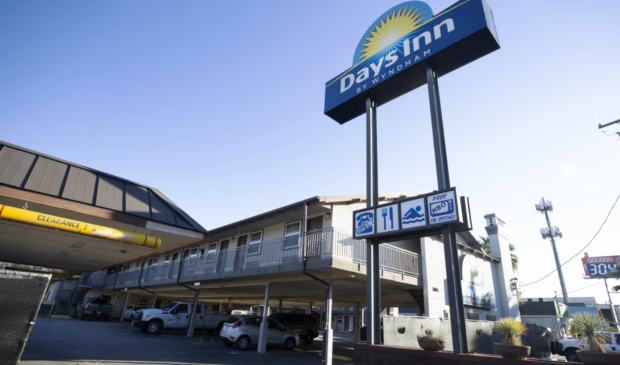The city is closing shelters it set up for homeless Austinites during Covid. Residents want to know when.
Monday, December 21, 2020 by
Andrew Weber, KUT Last Wednesday, Helen Davis was in St. Louis, tired, sore and 825 miles from home without bus fare or a place to stay.
As cars whizzed by, she wracked her brain, trying to think of an excuse – something to tell the bus driver so he’d let her on for free. She’d tried to pay in pennies that morning. It didn’t work.
Hours earlier, she was sheltered in Austin at one of five hotel properties the city set up to safely house homeless Austinites at risk of Covid-19. She was told the facility was closing and her best bet was a Greyhound ticket to St. Louis, where she’d lived a couple years back. So she took the ticket, fearing the prospect of once again sleeping outdoors.
Twelve-and-a-half hours later, she arrived in St. Louis – without shelter.
Davis is one of nearly 300 Austinites the city put up in so-called protective lodges, or ProLodges, during the pandemic. The program has largely relied on the prospect of federal funding, but that funding largely hasn’t shown up. Now, as city leaders consider closing, consolidating or converting some of the facilities, residents are uncertain what will happen next.
Passing Through
For Davis, uncertainty has been more or less a constant for the last half-year.
In April, she had an interview lined up for a job at Goodwill. Then she contracted Covid-19. She was homeless at the time, so she was taken to an isolation facility at a hotel.
“I had 108.9 fever for seven days in a row,” she recalled last week, ahead of her trip to St. Louis.
She got better and was moved to a Days Inn – known as ProLodge 3 – with the goal of finding permanent housing. That’s the city’s goal with these properties, and so far it’s housed about 75 people.
Davis says she was told repeatedly there wasn’t any housing available for her in Austin. Then she received a notice from staff saying the ProLodge was being consolidated and that she would be given five days’ notice before she had to leave.
Confused about whether she’d be moved to another facility, she took the ticket.

Helen Davis was given a bus ticket to St. Louis last week with the promise she’d have a place to stay. By the time she got there, that shelter was closed.
“I sat on that (housing) list for maybe about six months, and now they’re bringing me up in to the point where I have to take that Greyhound ticket,” she said. “(There’s) no housing in the area for me, as they’re claiming; no housing available. And, so that’s where I am at this point.”
The next day, she was on the bus, with a single dollar and some change, to St. Louis.
Davis said her case manager at Integral Care wrangled the ticket, which came from a voucher from the Ending Community Homelessness Coalition. She was told ECHO had called a shelter run by Assisi House in St. Louis to see if she could stay there.
But the shelter was closed due to Covid, so she had to find a place on her own, banking on the good graces of a driver to let her ride to a homeless shelter for free.
As Davis tells it, someone called Assisi House ahead, but didn’t check to see if she could actually stay there. Neither Integral Care nor ECHO would speak to KUT on the record about Davis’ case for this story, citing privacy laws. ECHO did tell KUT that it has provided 93 bus vouchers for clients so far this year.
Amy Price with Front Steps, the nonprofit that runs the Austin Resource Center for the Homeless, says the practice of providing vouchers, known as a diversion, is typically an effective way to get folks into housing.
“That’s a legitimate way to end homelessness for somebody,” she said, adding that clients often go to cities where they have family or friends who can house them.
Still, Price admits sometimes things don’t work out, and that’s been especially true during the pandemic.
“Covid has compromised our ability to do all of this. Different cities are at different levels and things may change between noon and 4 o’clock on a given day,” she said. “(Somebody may be) making their way toward a shelter and they get there and the rules have changed. These are difficult times for the staff and the clients.”
Davis was ultimately given another voucher and brought back to Austin to stay at ProLodge 1.
In four days, she’d gone from a soon-to-close hotel in Austin to a city 825 miles away (with higher Covid numbers, a harsher winter and no place to stay), back to Austin, where she has a place to stay, for now.
She told KUT Thursday she was happy to have gotten some rest, but she still hasn’t heard back from her new case manager at the Salvation Army.
‘Pack Everything Up’
Two of the ProLodges bought by the city are slated to be converted to housing, which means consolidating and relocating residents. The city plans on closing the remaining sites next year, partly for budgetary reasons.
The city had planned to spend $14.5 million from federal CARES Act money on the ProLodges and the isolation facility – as well as supportive services – but the estimated cost has ballooned to nearly $32 million. Part of the reason for that doubling is because the Federal Emergency Management Agency hasn’t reimbursed the city for the lion’s share of money it has put into these facilities – nearly $10 million for the properties alone.
Austin City Council approved a contract last week, however, to use FEMA money to house the 265 people staying in protective lodging.

Mary Malagon says she’s been told she doesn’t qualify for many housing programs because of her age, and she’s not sure what she’ll do when she has to leave the city’s protective housing.
Mary Malagon, who was staying at a different hotel than Davis, also got a flyer indicating a possible consolidation. Both women took that to mean they were essentially getting evicted.
Malagon says she’s been told she doesn’t qualify for some housing programs because she’s 65; the cutoff for many programs is 62, when clients qualify for housing programs for seniors.
She doesn’t know where she’ll go when her time is up at the ProLodge, but she’s also not sure when that will be. She wants to get a job in home health care, which she says she’s done for decades, but she needs a place to stay while she’s getting back on her feet.
The day-to-day uncertainty weighs on her.
“When you don’t pay your rent … you go by somebody else’s rules, and I can accept that. But it’s very worrisome,” she said. “I don’t sleep, because every day I think, maybe today’s the day they’re going to say, ‘Mary, pack everything up. You’ve got to go.’ And that’s it.”
Both Malagon and Davis told KUT they’d heard staff express confusion about the future of the ProLodges, some saying they were closing last Tuesday.
KUT asked the city for a timetable of closures and an interview with Vella Karman, the city’s interim homeless strategy officer. The city did not respond to the interview request and said staff would provide a clearer timetable in a forthcoming memo.
At a City Council work session Dec. 8, Council Member Ann Kitchen wanted a guarantee from City Manager Spencer Cronk that the city wouldn’t close or consolidate the shelters without first coming to Council.
“I would ask that you all return to Council and ask us before you close them,” she said. “I feel pretty strongly that we should not be closing ProLodges, because we are still in the pandemic and we are still seeing increases.”
Cronk agreed to Kitchen’s request, but it came six days after the city had already posted those notices in ProLodges, six days after Davis and Malagon saw them and a week before the confusion that followed for both of them.
This story was produced as part of the Austin Monitor’s reporting partnership with KUT.
The Austin Monitor’s work is made possible by donations from the community. Though our reporting covers donors from time to time, we are careful to keep business and editorial efforts separate while maintaining transparency. A complete list of donors is available here, and our code of ethics is explained here.
You're a community leader
And we’re honored you look to us for serious, in-depth news. You know a strong community needs local and dedicated watchdog reporting. We’re here for you and that won’t change. Now will you take the powerful next step and support our nonprofit news organization?













